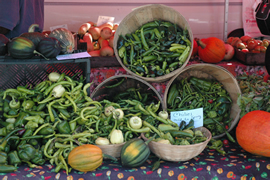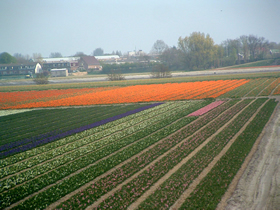Industrial Agriculture vs. Organic Farming:
Better Living through Chemistry?
By Joshua Coates

Organic farmers advocate saving the planet by not poisoning it with toxic chemicals, by allowing the diverse natural plant and animal life that originated here to flourish. They believe that working with rather than against nature will be the best hope for eliminating and reversing the damage we have already done. Organic farming and local farming go hand in hand. Organic farms are generally smaller farms geared towards serving a smaller and more local community, or a small segment of a larger community. This means fresh and healthy food for everyone they supply.

The organic view of the future is one where small organic farms provide food for the community they are in, a world where fresh local food renders the monstrous wastes of packaging and shipping unnecessary. The factories that produce the chemicals needed for conventional farming, and all the pollution they spew into our atmosphere and drinking water, will also be unnecessary. Because they are a response to the destruction of the environment, organic farming is, by definition, better for our planet. Of course, buying organic also helps the farmers themselves.
In a time of widespread unemployment, how advisable is it to buy conventional produce that exists only because countless small farmers have been driven out of business, either by the competitive market or by being bankrupted over unfair lawsuits with major agribusiness corporations? Along with many races of plants, animals, and insects, small farmers are going extinct at the merciless hands of agribusiness.
Kimbrell informs us that monoculture farming has caused the extinction of countless varieties of corn, apples, tomatoes, potatoes and just about every other food we are used to consuming. “According to a study by the Rural Advancement Foundation International, 75 types of vegetable, or approximately 97 percent of the varieties available in 1900, are now extinct.” For example, over 80 percent of tomato varieties are now extinct, over 92 percent of lettuces are also extinct, a staggering 96 percent of corn breeds are gone forever, and potato varieties have been reduced to just 4 types for the majority of potatoes grown worldwide.

This has all happened in less than 100 years. Kimbrell maintains this is a direct result of large scale, chemical-laden monoculture farming. Organic farming embraces diversity and strives to grow and protect as many varieties of crops as possible, providing a wide array of delicious choices rich in nutrients for us to enjoy. A diet free of carcinogenic chemicals and rich in vitamins, minerals, and nutrients combined with an environment where chemicals have not rendered our air toxic and water undrinkable is our best hope for living long, healthy, cancer-free lives. This will not be possible under the industrial farming regime.
In order to save the environment and ourselves, things must change. This is a daunting concept. Agribusiness is so big and has its claws in so deep it seems inconceivable that we could defeat it, but we must. We can fight them, but it will mean changing how we live, how we eat, and how we spend our money. Battling these corporate giants may seem impossible, but all it takes is choosing not to support them. Our dollars are our only voices sometimes, and we can be heard if we channel our dollars into local organic farms and small businesses and away from factory-produced food devoid of nutrition and chock full of toxins.
We need to aim for more than just boycotting these agribusiness giants to force them to change-- we need to support small farmers and cut off the monetary life flow to these giants and force them into extinction, before they force small farmers and countless more varieties of crops into extinction instead. You might think that the higher prices of organic produce make buying organic impossible on a limited budget, but the more people buy organic, the cheaper it will get. We have already seen this happening over the last few years. And by even buying just a percentage of your food organic, you can make a significant impact. You can start small, but we must all start somewhere.

There is also an even cheaper alternative, and that is growing delicious organic food yourself. The cost of a seed is usually less than 1 percent of the cost of just one of the vegetables that the planted seed will produce. Growing even a fraction of the food you would normally purchase could lead to substantial monetary savings. Start with growing even just one or two things you really enjoy eating, and you will find that the enjoyment gained from growing and then eating food you produced yourself is incomparable. For a minimal investment of time and money, you can have ripe juicy tomatoes you grew yourself, spicy peppers and herbs to cook with, or lettuce to go trim anytime you want a salad. Imagine if the only things you needed to make salsa that weren’t in your garden were salt and a little lime juice.
As Wendell Barry pontificates in his article “The Pleasures of Eating,” what better way to ensure that the food you are eating is safe than to produce it yourself? He explains, “People who know the garden in which their vegetables have grown and know that the garden is healthy and remember the beauty of the growing plants…” will surely enjoy these vegetables in a deeper more intimate way. There is a great disconnect in the mind of the American people between our food and the land from which it comes. We all must in some ways get back in touch with nature. We can still enjoy the benefits of a modern society, but letting every decision that is made for us by multinational corporations go unchallenged is signing our own death warrant.
Did you like the article? Subscribe here to our New Article Email Alert or RSS feeds.
Sharing is caring! Don't forget to share the love, and keep the conversation going by leaving a comment below:
Advertisement
